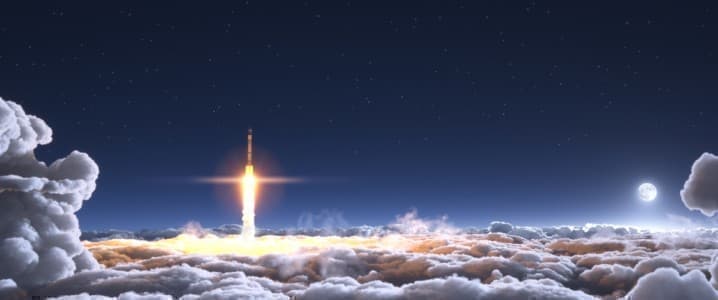Space has been commercialized. It’s now being militarized. Next could it be colonized? Some experts think we’re on track for an all-out space race between the United States and China to not only put boots on the moon but to set up camp there to extract rare minerals. There are international treaties that prevent governments from claiming territory in Space, but if history has taught us anything, it’s that a) treaties were made to be broken when the payout is high enough and b) human nature loves a loophole.
“It is a fact: we’re in a space race.” Those were the words of the leader of NASA himself, Bill Nelson said in a recent interview with Politico. The former Florida senator and astronaut went on to say: “And it is true that we better watch out that they [China] don’t get to a place on the moon under the guise of scientific research. And it is not beyond the realm of possibility that they say, ‘Keep out, we’re here, this is our territory.’”
Nelson isn’t the only NASA personnel who thinks that there is a major battle playing out between these two major Earth and space powers. “On one level, it is a political competition to show whose system works better,” said Terry Virts, a former commander of the International Space Station and Space Shuttle and a retired Air Force colonel. “What they really want is respect as the world’s top country. They want to be the dominant power on Earth, so going to the moon is a way to show their system is working. If they beat us back to the moon it shows they are better than us.”
As true as that may be of China, the same could easily be said for the United States. NASA is currently undergoing a program to send astronauts back to the moon as early as 2024. But it’s not just the U.S. government that’s trying to make an atmospheric statement; the private sector wants in, too. As space has become more and more commercialized as a kind of amusement park for multi-billionaires, it’s become increasingly clear that with enough money and enough hubris, nearly anything is possible in the final frontier.
A recent opinion piece in Energy Intelligence arguing that a space race of colonialist proportions is already well underway points out that while the 1967 “Treaty on Principles Governing the Activities of States in the Exploration and Use of Outer Space, including the Moon and Other Celestial Bodies,” better known as the “Outer Space Treaty,” strictly prohibits nations from making sovereign claims in outer space, the treaty didn’t foresee the need to put the same rule into writing for private enterprises.
What exactly are all of these competing interests after on the moon? According to Energy Intelligence, “the area of interest on the moon is the lunar south pole, where concentrations of valuable minerals, water and geographical features conducive to sustaining 24-hour solar power generation combine to create the ideal conditions for the creation of a moon colony.” The existence of rare minerals in space is of crucial interest for global industry because it could potentially allow a workaround for both the “rare” and “Earth” parts of these minerals that are so essential to so many supply chains.
These minerals are particularly essential to many components in electric vehicle batteries and in renewable energy infrastructure, meaning that demand for metals like lithium and cobalt is already rising quickly and getting ready to go gangbusters. Already, a geopolitical battle is unfolding over these materials as different interests move to snap up proven reserves and shore up supply chains. It stands to reason that this battle could easily spill over into space if the demand outstrips the supply here on Earth.
This kind of interstellar exploitation is worrying, to say the least. Not only is it fertile ground for geopolitical conflict and colonialist posturing, it stands to violate basic principles of sovereignty. As the Energy Intelligence Group wrote last week, “The interests ‘of all mankind,’ it seems, is no longer the driving factor behind lunar exploration, instead replaced by the kind of national chauvinism space exploration was supposed to supersede.” Although, if you look at the defense budgets already being spent on space militarization, and the agendas of companies touting space tourism such as Virgin Galactic, SpaceX and Blue Origin, those principles have already been slipping for quite some time now.
By Haley Zaremba for Oilprice.com
More Top Reads From Oilprice.com:
- Chinese Demand Will Drive Oil Prices This Year
- Goldman: The Fed Is Approaching A “Critical Inflection Point”
- Big Oil Speaks Out Against Trudeau’s “Just Transition” Bill


















